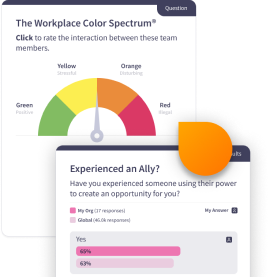
Creating a Speak-Up Culture
Course Video Preview
Two coworkers discuss how the company is pushing to sell product that may be unethical.When there's crime, misconduct, or fraud within the business, everyone is affected. That’s why whistleblowers are crucial to stopping or preventing potential problems. They are the single most effective source of information in detecting corporate fraud and crimes. People and compliance leaders need to cultivate a 'speak-up' culture at work. That means deploying effective situational awareness training that focuses on building core skills that not only help employees uphold company policies.
Course DescriptionThis course reviews the basics of whistleblowing — what defines a whistleblower and why are they important to our society? It provides examples in different contexts from health care, to social media, and more. Use this training to review the legal elements of whistleblowing, and teach employees when and how to report a concern.
Key Concepts- Understand the importance of whistleblowers to our society.
- Identify who is a whistleblower and why.
- Identify the situations when people should report fraud or other organizational problems.
- Understand our process and policies for reporting.
- Foster a speak-up culture to stop problems at the earliest opportunity.
Course Features
- Access to our Anonymous Ask the Expert tool
- Rich video scenarios based on real-world events
- Built-in employee sentiment surveys
- 50+ Machine Translation Options
- Optional program timer
- Policy acknowledgement tool
- Extensive customization options

Lessons
Whistleblowing
What Defines a Whistleblower?
When Should You Report?
Our Hotline, Controls, Policy and Procedures
Provide Your Feedback
Relevant Courses
Complementary Microlessons
Recommended Resources
From ‘Ask the Expert’
Emtrain’s Ask the Expert feature enables users to ask questions about compliance, bias, harassment, and diversity & inclusion as they come up. It’s all confidential, and answers are sent straight to their inbox. View some of the example questions below and see the Experts answers.

